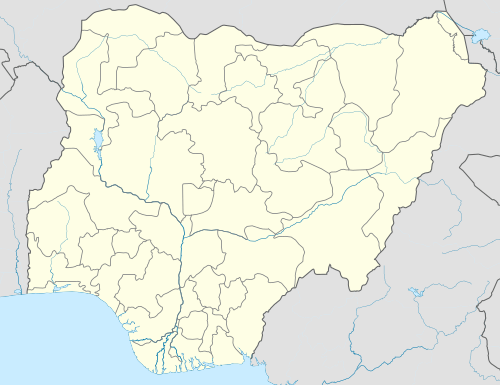Kingdom of Warri
| Warri | |
|---|---|
| Traditional state | |
 Warri Location in Nigeria | |
| Coordinates: 5°31′N 5°45′E / 5.517°N 5.750°E | |
| Country |
|
| State | Delta State |
| Government | |
| • Olu | Ogiame ikenwoli 1 |
The Kingdom of Warri is a traditional state based on the town of Warri in Delta State, Nigeria. Warri is an inland port on one of the Niger River channels in the Niger Delta. The Olu (king) of Warri is the head of the Itsekiri people.
History
According to Bini and Itsekiri histories Ginuwa, a prince of Benin founded the Iwerre (Warri) Kingdom about 1480. In the 15th century Warri was visited by Portuguese missionaries. At the beginning of the 17th century, a son of the reigning Olu was sent to Portugal and returned with a Portuguese wife. Their son Antonio Domingo was Olu of Warri in the 1640s.[1] Olu Erejuwa, who reigned from about 1720 to 1800, expanded Warri politically and commercially, using the Portuguese to further Warri's independence of Benin and to establish control over a wider area.[2]
Later Warri served as the base for Portuguese and Dutch slave traders. Warri became a more important port city during the late 19th century, when it became a centre for the palm oil trade and other major items such as rubber, palm products, cocoa, groundnuts, hides, and skins.[3] Warri was established as a provincial headquarters by the British in the early 20th century.[4]
Recent events
In 1997, the Federal Government under General Sani Abacha created a Warri South-West Local Government Council, with headquarters at Ogbe-ijaw, an Ijaw settlement near Warri. Due to political pressure by the Itsekiri's, the headquarters was then relocated to Ogidigben, an Itsekiri settlement. Riots ensued, hundreds died, and six Shell Nigeria installations were taken over by youths. The crisis is known as the "Warri Crisis".[5]
Itsekiri Kings, 1480 to present
The Kingdom of Warri has remained predominantly Christian since the coronation of its first Christian King Oba Atorongboye also known as King Sebastian I in 1570, within a century of the foundation of the Iwerre Kingdom. Below is a list of the rulers of the Warri Kingdom from inception. Note that written records began with the coronation of Olu Atorongboye Sebastian I in 1570.
- Ginuwa I (1480- 16th century)
- Ogbowuru I (16th century)
- Irame I (16th century)
- Ojoluwa I (16th century)
- Esigie I (16th century)
- Atorongboye I A.K.A. Sebastian (1570- 1620 AD
- Atuwatse I A.K.A Oyeomasan Don Domingos (1625–1643)
- Oyenakpara I A.K.A Obanighenren Don Antonio Domingo (1643–1653)
- Omoluyere I (17th century)
- Abejoye I A.K.A Matias (17th century)
- Akenjoye I A.K.A Ludivico Domingo (1675–1709)
- Omagboye I (18th century)
- Akengboye I A.K.A Agostinho Sabastiao Octobia (1730–1732)
- Atogbuwa I A.K.A Manuel Octobia (1734–1760)
- Erejuwa I A.K.A Sebastiao Manuel Octobia (1760–1795)
- Akengbuwa I A.K.A Eyeolusan Joao (1808– 14 June 1848)
- Ginuwa II A.K.A Emiko Ikengbuwa (7 February 1936– 8 January 1949)
- Erejuwa II A.K.A Wilson Ayoronmitsi Gbesimi Emiko (24 March 1951 – 17 December 1986)
- Atuwatse II A.K.A Godwin Toritseju Emiko (2 May 1987– 5 September 2015)
- Ikenwoli I A. K. A Godfery ikenwoli Emiko (12 December 2015–)
Iye Idolorusan ruled the kingdom for a time in the nineteenth century, but seems never to have been formally designated a monarch.[6]
References
- ↑ J.O.S Ayomike. "Edo people's renaissance". Edo Nation. Retrieved 2010-09-16.
- ↑ Gab Ejuwa (26 April 2009). "Olu of Warri Coronation – Focus On Itsekiri Cultural Heritage". Vanguard. Retrieved 2010-09-16.
- ↑ http://www.greatestcities.com/Africa/Nigeria/Warri_city.htmlRetrieved 13 January 2008
- ↑ Ekeh, Peter Palmer (2005). Warri City and British Colonial Rule in Western Niger Delta. Urhobo Historical Society. p. 31. ISBN 978-064-924-7.
- ↑ Manby, Bronwen (1999). Price of Oil: Corporate Responsibility and Human Rights Violations in Nigeria's Oil Producing Communities. Human Rights Watch. pp. 111–112. ISBN 1-56432-225-4.
- ↑ Professor Henry Louis Gates, Jr.; Professor Emmanuel Akyeampong; Mr. Steven J. Niven (2 February 2012). Dictionary of African Biography. OUP USA. pp. 1–. ISBN 978-0-19-538207-5.